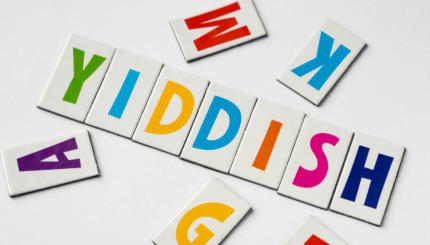Though primarily a West Germanic language of Indo-European origin, English incorporates words from countless languages, including Hebrew. Often, these words have religious connotations and come to English through the Bible, for example: hallelujah, amen, sabbath and kosher. In other cases — words like sack and jacket — it’s less clear why these words are derived from Hebrew instead of some other language.
Hebrew is part of the family of Semitic languages. (In fact, the word “Semitic” is of Hebrew origin, deriving from the biblical character Shem, one of Noah’s sons.) In some cases, it’s not entirely clear if the word in question is imported directly from Hebrew or another Semitic language, like Akkadian or Phoenician.
Adonis: In classical Greek mythology, Adonis was the human lover of the goddess Aphrodite. His outstanding trait was his unsurpassed beauty and thus the term’s use as a description of an extremely handsome man. The name actually comes from a Hebrew (possibly by way of Phoenician) word, adon, meaning lord. This remains one of the words Jews use for God (Adonai, literally means “my Lord”) and in the popular hymn Adon Olam (Master of the World).
Amen: The word amen is built on the Hebrew verbal root aleph-mem-nun (אמנ), which means faith or belief. Reciting amen therefore indicates that the speaker affirms the truth of what was said.
With your help, My Jewish Learning can provide endless opportunities for learning, connection and discovery.
Babble: The origins of this word are obscure. It may come from the word “baby,” which itself is likely derived from the sorts of syllables that young children make when they are learning to speak. Some suggest it derives from the story of the Tower of Babel (bavel in Hebrew, the word for ancient Babylonia). In this famous story, God caused people to speak different languages so they could not understand one another and seemed to babble.
Bedlam: Meaning mayhem, bedlam is a medieval form of Bethlehem, the Judean town where Jesus was born. The Hebrew name of the town was Beit Lechem, meaning House of Bread. The word bedlam originally referred to the London Hospital of St. Mary of Bethlehem, which became a psychiatric institution in the 15th century. By the 17th century, bethlehem morphed to bedlam and became a general term for any hospital that housed mentally ill patients, and from there a byword for any scene of pandemonium.
Behemoth: In the Hebrew Bible, a behemah is a wild land animal. One of the great primordial beasts mentioned in the Bible, the Behemoth, takes its name from the “intensive plural” of this word — meaning a plural form that doesn’t refer to multiples but to a much stronger or more intense form. Similarly, leviathan derives from the Hebrew leviatan, a primeval sea monster found in the Book of Job.
Brouhaha: Meaning a hubbub or noisy commotion, this word was first recorded in the 19th century in French, where it appeared as three words: brou ha ha. It was often placed in the mouth of the devil. There is speculation that it may derive from the Hebrew expression barukh haba (“welcome”) because Jews were frequently heard saying this to one another but it was incomprehensible to those who did not speak Hebrew.
Cabal: Meaning an evil plot, the word cabal is connected to the Jewish mystical tradition called Kabbalah. The word kabbalah derives from a Hebrew root that means reception, implying the mystical traditions have been received and then transmitted. After it was first used as a word for nefarious plotters in medieval France, the word popped up in 17th-century England where it was applied to a special committee of five ministers whose last names began with the letters C, A, B, A and L (Clifford, Arlington, Buckingham, Ashley and Lauderdale). These five ministers, serving under King Charles II, effectively ran the government.
Camel: The word for camel comes from Greek kamelos, which itself likely draws on the Hebrew (or possibly Arabic) word gamal. Gamal sounds similar to the Hebrew letter gimmel (ג) and it is speculated that the letter itself might be a pictogram of the animal.
Cherub: One of the Bible’s words for angel is kheruv, which gives rise to the English word cherub. Two kheruvim, for instance, are mounted on the Ark of the Covenant, and the Garden of Eden is guarded by a kheruv wielding a fiery sword. Because they are represented as winged babies in medieval Christian iconography, many people picture them as small and adorable. The biblical conception, however, is much fiercer. The idea that cherubs are babies may derive from a later rabbinic folk etymology which claims that the Hebrew kheruv is derived from the Aramaic ke-ravya, meaning “like a child.” Similarly, seraph, another celestial being, is based on a biblical Hebrew word of the same meaning.
Cider: These days, people use cider to mean unrefined apple juice, but for most of history it has referred primarily to a fermented drink. As such, it derives from the Greek word sikera which comes from the Hebrew shekar, which means “strong drink.”
Jacket: The word jacket derives from an Old French word, jaquet, which itself comes from the popular French given name Jacques. That name is likely the French equivalent of Jacob, or Yaakov in Hebrew, but it could be the equivalent of John (Yochanan in Hebrew). Either way, jacket apparently derives from a biblical Hebrew name.
Jubilee: Jubilee comes to us through the Latin jubilaeus, which itself comes from the Hebrew word yovel. This is a Hebrew name for the occasion, every 50 years, when debts were forgiven and slaves freed. Today, jubilee continues to refer to a 50th anniversary. Latin frequently represented the Hebrew letter yod (y), and in the case of jubilee may have converted the o of yovel to a u to create an association with the Latin word jubilare, or jubilation, reflecting the mood of this momentous year which was experienced, by most people, once in a lifetime.
Kosher: Referring to food that is suitable for a Jew who follows Jewish dietary law to eat, kosher derives from the Hebrew kasher meaning fit. In English, it is used colloquially far beyond food.
Map: The word map derives from the Latin mappa meaning napkin or cloth because this is what maps were originally drawn on. The Latin term derives from a Semitic root, mappa, of the same meaning. In Modern Hebrew, the word mappa means both tablecloth and map and the related word mapit means napkin.
Maven: Meaning expert, the word maven derives from a Hebrew verb that means to understand. It comes to English through Yiddish.
Messiah: In Hebrew, mashiach, the term for the messiah, didn’t originally mean an end-of-days savior, but instead referred to anyone who was anointed, usually a king. In Jewish tradition, the ultimate Messiah will derive from the line of King David, who established the eternal ruling dynasty of the Jewish people.
Ruthless: The biblical Ruth (Hebrew: rut, likely derived from the Hebrew word for friendship) was known for her kindness and her name was adopted as an old English word for pity (which had a more positive meaning centuries ago). That usage is now archaic, but ruthless — i.e., merciless — is still part of our lexicon.
Sabbatical: Meaning a period of rest, a sabbatical often applies to a person taking leave from a job. Sabbatical is derived from the Hebrew word shabbat.
Sack: The Hebrew word sak has the same meaning as the English: an open-ended bag. The word gives rise to many other English variants, including satchel, knapsack and rucksack. It is also the origin of the word sackcloth (also sak in Hebrew, see Esther 4:1), meaning the coarse material used to construct a sack.
Sapphire: This gemstone can be traced back to the Latin sapphirus and the Greek sappheiros, but it is suspected that it comes to those languages from a Semitic language. In the Hebrew Bible, God sits in the heavens on a throne that appears to be made of the gemstone sappir, which is usually understood to mean sapphire. (Exodus 24:10, Ezekiel 1:26)
Want to learn Hebrew one day at a time? Click here to sign up for our Hebrew Word of the Day email.



